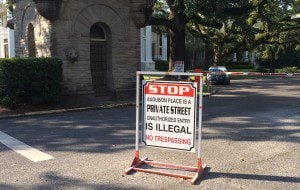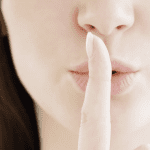 I decided to take a picture of the most violent thing I’ve seen so far in New Orleans. Maybe that sounds silly to you. How can a sign in front of a peaceful gated community filled with ten million dollar homes far away from the tear gas street battles taking place tonight in Ferguson, Missouri be violent? But the ideology that is articulated in this sign is the source of great violence: the idea that super-rich white people must be kept absolutely safe and segregated from the poor people of color who surround them in a chocolate city like New Orleans no matter what the cost. The sense of entitlement and paranoia in this ideology does not limit its expression to intimidating signs in front of “private streets.” It’s part of an unnamed discourse that shapes millions of white peoples’ instincts and reactions to people of color in their daily lives, including the police officer who shot Michael Brown in Ferguson, Missouri.
I decided to take a picture of the most violent thing I’ve seen so far in New Orleans. Maybe that sounds silly to you. How can a sign in front of a peaceful gated community filled with ten million dollar homes far away from the tear gas street battles taking place tonight in Ferguson, Missouri be violent? But the ideology that is articulated in this sign is the source of great violence: the idea that super-rich white people must be kept absolutely safe and segregated from the poor people of color who surround them in a chocolate city like New Orleans no matter what the cost. The sense of entitlement and paranoia in this ideology does not limit its expression to intimidating signs in front of “private streets.” It’s part of an unnamed discourse that shapes millions of white peoples’ instincts and reactions to people of color in their daily lives, including the police officer who shot Michael Brown in Ferguson, Missouri.
Racism is actually very easy to spot in the US; just look at the geography of any city. In every other country in the world, the rich people live at the city center where land is expensive and poor people live in the outskirts where land is cheap. The reason that every major US city has the opposite geography with rich people on the outskirts and poor people in the inner city is because of racism. The US phenomenon of suburbia was created by the white flight of the 1960’s and 1970’s as white families reacted to the desegregation of their neighborhoods and schools in the city. The multiculturalism that’s trickled into suburbia in recent decades has not erased the sublimated racist paranoia about “safety” at the core of suburban consciousness.
When we told people we were moving to New Orleans, one of the first things everyone asked is what we were going to do about “the schools down there.” Some of our friends have friends in the New Orleans area who live in the suburbs where the schools are “safe.” When we told people we weren’t going to live in the suburbs because we wanted to be close to Tulane’s campus where I work, we were encouraged to “budget for private schools,” which is pretty hard to do on a campus minister’s salary since my wife hasn’t found a job yet. We ended up putting our kids in a charter school (there are hardly any non-charter public schools left in New Orleans). The people we talked to usually breathed a sigh of relief when they heard that our kids are going to a charter school and left it alone after that, because charters are deemed to be “safe” since they’re not straight-up public schools.
What I haven’t told our concerned friends is that, judging from the open house and pickup line at school, our sons are in a student population that is probably 80+% black. What I don’t say aloud to anyone is that I have been nervous about how they will do, because I am still struggling with my own racism. Basically, I presume that black people cannot possibly be nerdy and socially awkward in the same way that I am and the way I presume my sons to be, so I’m scared that my sons are going to get teased and bullied. I’ve got an archetype in my head of the black man who’s manly in all the ways that I’m not: athletic, confident, smooth with women, quick and decisive with his words. And I’m dreadfully intimidated by this imaginary black man that I’ve amalgamated from the various media sources that have created him, despite the fact that I’m best friends with an actual black man who’s gay and sings opera and makes me laugh constantly and doesn’t intimidate me at all.
Many white people think that racism can only be racism if it involves intentionally hating a specific individual in their lives on account of that individual’s race. Under that very limited definition of racism, very few white people even in the height of segregation have ever been racist. White people have always had black friends, even when they were friends with their slaves. Racism more often takes the form of a secret fear of the generic black bogeyman in our heads who is probably nothing like the black people we actually know and love personally. We usually don’t recognize this bogeyman as being “black” per se. He’s just what we imagine when we think “thug” or “burglar” or “mugger.” He’s a terrifying meme that’s been created by thousands of images we’ve seen and thousands of conversations we’ve had about “inner city crime” or “gangsta rap” or “out of control teenage boys.”
Most white people aren’t in the position to do direct harm to black strangers they encounter based upon the fearful bogeyman in our heads. Usually we just move to suburban neighborhoods where the black guys wear polo shirts, drive Lexuses, and make the same corny chitchat that we do. But when you give a white man a badge and a gun and put him in a “rough” neighborhood that he isn’t from after being immersed in a police culture that’s increasingly militarized and trained to interact with the local population using counter-insurgency tactics, then he will shoot his bogeyman multiple times in a rush of adrenalin to make sure that he’s dead, regardless of how high his hands are raised in the air.












